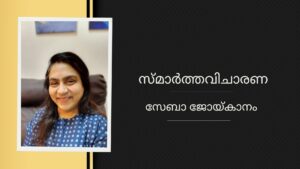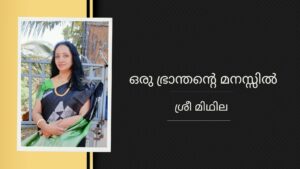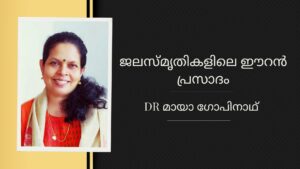When the earth was steaming under the scorching sun, the writer Somarajan’s literary life, his childhood home, and the village where he grew up were all to be captured on camera. Prakash Babu, a writer and director from Kasargod, and Nandandas, a cameraman from Thrissur, along with his assistant, came to do the shoot. Prakash praised the camera work to the skies. Every minute of his friend Nandan, a famous cameraman in many films, was valuable. He was taking two weeks off after finishing a film shoot, and Prakash suggested they use this time for a half-hour documentary. “You are a legend in the literary world,” Prakash said. “Through this documentary, we will bag many awards.”
Hearing such sweet words, Somarajan’s heart leaped like a train rushing ahead. Every word Prakash spoke filled him with confidence and energy. A decision was made to make the documentary for one lakh rupees.
When the evening clouds rose above the deep ocean, Somarajan warmly welcomed Prakash and his team into his home. Somarajan felt that Prakash was a loving, sincere, and innocent person. He had met Prakash when he won the prestigious “Mahakavi Award” in Kasargod for his travelogue. Prakash was the secretary of the Mahakavi Foundation. Somarajan was told that to receive the award, he had to donate five thousand rupees to the foundation’s charitable activities, which he gave in Prakash’s name. Initially, it was said that the award would be presented by the Chief Minister, but that turned out to be false. When Somarajan saw the list of award winners, he was shocked—there were about forty people. The award ceremonies in the name of great geniuses seemed like a money-making scheme.
Night swallowed the day. Prakash had anticipated the need for alcohol. In the dim light of the cave-like room, attractive liquor bottles were lined up. Prakash’s intoxication grew and bloomed like flowers within him. The others in the team didn’t drink much. Prakash revealed a crude side to his personality. When Nandan went to the next room to open the fridge, he whispered in Somarajan’s ear, “Don’t let him drink too much, or he’ll become uncontrollable.”
Somarajan, who was diabetic and took insulin, had chocolate sweets stored in the fridge for emergencies when his blood sugar levels dropped. But Prakash and his team took liberties and consumed the chocolates. Taking everything for oneself with selfish freedom is a bad habit.
Everyone had dinner and went to sleep. Prakash’s energy had completely drained away into the alcohol. The night ended, and the door opened to the rays of the morning sun. Prakash, sitting in a drunken stupor, praised Somarajan’s hospitality. The camera lenses gleamed in the morning sunlight. After completing the documentary shoot, Prakash and his team expressed their gratitude and left like dear friends.
The very next day, Somarajan received the edited video via email. His confidence soared. The supposed half-hour video was actually an hour and a half long. He called Prakash to ask how the half-hour film had become so long. The answer he received was, “No problem, sir, we can reduce it to half an hour. But the studio won’t do it for free. It’ll cost an additional fifty thousand rupees.”
Somarajan felt numb, like a man who had been cheated. With an uneasy mind, he stepped outside. The wind blew fiercely, and dark clouds flashed in the sky. The person who had filled him with confidence had deceived him. Prakash also refused to translate the video into English unless Somarajan paid another twenty thousand rupees. Distressed, Somarajan sent an additional seventy thousand rupees. He waited for weeks, then months. Finally, he got an answer: Prakash claimed to be undergoing treatment in a hospital. But when Somarajan asked people from Kasargod, he learned it was a lie.
Somarajan’s mind was restless. The betrayal he had experienced caused inner turmoil. Finally, he called Nandan and explained everything. Nandan was shocked to learn that Somarajan had paid over a lakh and a half rupees. Nandan revealed that very little had gone into the actual camerawork. Prakash had cheated many people, a story Nandan now told openly.
Unable to sleep in the loneliness of the night, Somarajan thought about the exploiters in the art and literary world. Despite paying the money, how could a writer be so cruel and deceitful? How could such a person become a writer? The mental agony struck Somarajan’s mind like a storm. This spider, using the name of a great poet, was trapping artistic talents in his web of deception. Nandan spoke with guilt: “This cheater must not be allowed to deceive anyone else like this. We must take him to court and ensure he’s punished.”
Somarajan began preparing to take legal action with his lawyer. His once-smiling face was now filled with sadness, and his eyes reflected deep sorrow.
(Translated by Kavitha Sangeeth)
About The Author
No related posts.





